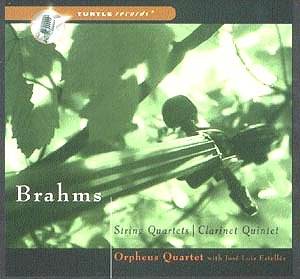BRAHMS
String Quartets Op. 51/1 & 2, Op. 67
Clarinet Quintet Op. 115
 Orpheus Quartet with José
Luis Estellés
(clarinet)
Orpheus Quartet with José
Luis Estellés
(clarinet)
 Turtle Records
499018 [67.30+68.15]
Turtle Records
499018 [67.30+68.15]
Turtle records

These are the warmest and most satisfying recorded performances of these
well-loved and oft recorded masterworks, which I have heard in many a year.
I was especially struck by the natural way in which the cross rhythms of
the Op. 67 quartet were smoothly integrated; that last and least popular
of the three can easily sound dry and academic. I will not embark upon any
comparisons with the numerous recent recordings of the quartets.
The Orpheus Quartet, which has won accolades everywhere, is uncommonly
multinational, its members (who have remained together since its formation
in 1987)) being respectively Romanian, French & Dutch; all linguists,
with German their main working language together. We are told that all those
languages may flow during their interpretation discussions during rehearsal!
Perhaps those unshared backgrounds contribute to a sense of continually listening
and responding to each other, which is of the essence of great chamber music
playing.
They were enjoyed live in San Sebastian at the
2000
Homage to Luis de Pablo series to celebrate this leading
Spanish composer's 70th birthday, where they were joined by this Spanish
clarinettist, 1st clarinet in the Orquesta Ciudad de Granada. Estellés
is a real find - formerly a pupil of Anthony Pay in London, he brings a suave
and mellifluous tone and uncanny sense of ensemble, together with an unassuming
air which was immediately evident in the recording session.
My reference for the clarinet quintet is the famous Busch/Kell account, which
has never been out of the catalogues for long (EMI
CDH7
64932-2). There are important and fascinating differences from that
interpretation here. Estellés eschews Kell's gypsy abandon in the
middle section of the slow movement, and perhaps his more restrained and
inward approach is more in keeping with that late work's autumnal feeling.
Nor is there the dark, anguished conclusion which Kell & the Buschs bring
to the variation finale. Above all, as he demonstrated in de Pablo's new
and very special clarinet quintet, Estellés recognises in both works
that the clarinet is an integrated member of a five-fold group, not at all
the showy soloist required for Weber's quintet.
Presentation is very pleasing, even though the producers have made the fair
assumption that purchasers are likely to be well acquainted with the music,
making programme notes redundant for once. We are told more about the players
and their approach to music making and there is, for the technically interested,
a detailed account of recording procedures and equipment in the booklet,
which is dated September 1999. No reservations, and this is definitely a
five-star set.
Peter Grahame Woolf

Crotchet
